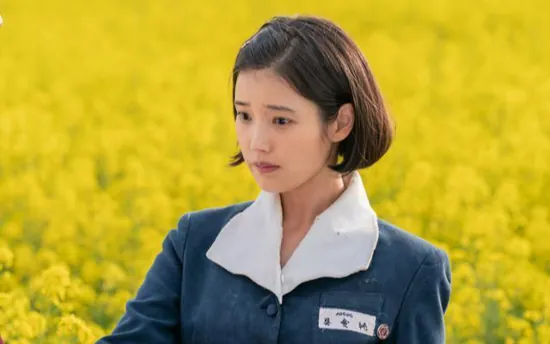
How 'When Life Gives You Tangerines' is Turning Global Hearts into Tangerine Slices!
2025-03-30
Author: Jia
Netflix's latest sensation, "When Life Gives You Tangerines," has taken the world by storm, dominating the streaming giant's global non-English TV charts since its debut on March 7.
This heartwarming series, originally known as "Pokssak Sogatsuda," which translates to "you worked so hard" in the Jeju dialect, quickly climbed to the No. 1 spot in Netflix's Top 10 for non-English shows.
Astonishingly, it has secured a coveted position in the top 10 rankings across 42 countries, capturing the hearts of audiences from Brazil to Turkey!
Viewers worldwide can't stop raving about the series. Social media platforms like YouTube and Instagram are flooded with enthusiastic comments praising the depth of storytelling.
Posts like “I can’t believe they encapsulated three generations in such a short drama” and “It’s hands down the best Korean content I’ve ever seen!” showcase the show's profound impact.
Netflix's official YouTube channel has even described it as a true "masterpiece."
Set against the picturesque backdrop of Jeju from the 1960s onward, "When Life Gives You Tangerines" weaves together the narratives of three generations of women, centering on Oh Ae-sun, portrayed by the beloved singer IU.
Ae-sun's character, a bright yet underprivileged woman, navigates the challenges of gender-based discrimination.
The series deeply intertwines unique Korean customs, such as tossing red beans to ward off evil spirits and saluting the flag during the national anthem—a reflection of rich cultural heritage that international viewers may not find immediately relatable.
To enhance the experience, the distinct Jeju dialect presents an additional layer of complexity.
Netflix tackled these cultural hurdles creatively.
Recognizing the unfamiliarity of the original Jeju expression, the series was renamed “When Life Gives You Tangerines” for English-speaking countries, cleverly replacing the popular phrase involving lemons with a local twist.
The representative noted, “'You worked hard' isn’t a common phrase in English, so we aimed to convey the essence of resilience and perseverance.”
The series didn’t stop there.
Titles in other regions echo local sentiments too; in Thailand, it translates to “Smile even when tangerines aren’t sweet,” while Taiwan's version plays on a Chinese idiom, emphasizing that sweetness may follow bitterness.
This thoughtful localization is a testament to Netflix's commitment to connecting with diverse audiences.
The show's attention to detail extends to its dialogue and poetry, with a poignant children's poem by young Ae-sun, titled “Gaejeombok,” preserving its lyrical essence in English.
Phrases like “Abalone every day / Abalone when it’s stormy and gray” maintain the rhythmic melody of the original Korean verse.
At the heart of this compelling narrative are universal themes that resonate deeply with audiences: the unbreakable bond between parents and children, the significance of family, and the enduring strength of love.
Many viewers have shared their emotional responses on social media, revealing personal connections to the story.
Comments like “My mom’s words made me cry” and “A life without love is meaningless” highlight the show’s ability to evoke deep, shared human experiences.
Yoon Seok-jin, a professor at Chungnam National University, asserts that the series touches on a narrative that transcends cultural boundaries, especially the complex mother-daughter relationships that resonate with younger audiences.
Yoo Seung-chul from Ewha Womans University commended the balance the show strikes between regional authenticity and global emotion, suggesting that sincerity in storytelling can bridge cultural divides.
Cultural critic Kim Heon-sik remarked on the importance of the show's adaptations, noting that by aligning the title and dialogue with local cultures, it has successfully navigated potential barriers.
“It could serve as a model for future Korean content aiming for global reach,” he said.
As "When Life Gives You Tangerines" continues to tug at the heartstrings of audiences worldwide, it’s clear that Korean storytelling—rooted in tradition yet universally relatable—is more powerful than ever.
Don’t miss out on this emotional rollercoaster that reminds us all: sometimes life’s challenges can lead to the sweetest rewards!


 Brasil (PT)
Brasil (PT)
 Canada (EN)
Canada (EN)
 Chile (ES)
Chile (ES)
 Česko (CS)
Česko (CS)
 대한민국 (KO)
대한민국 (KO)
 España (ES)
España (ES)
 France (FR)
France (FR)
 Hong Kong (EN)
Hong Kong (EN)
 Italia (IT)
Italia (IT)
 日本 (JA)
日本 (JA)
 Magyarország (HU)
Magyarország (HU)
 Norge (NO)
Norge (NO)
 Polska (PL)
Polska (PL)
 Schweiz (DE)
Schweiz (DE)
 Singapore (EN)
Singapore (EN)
 Sverige (SV)
Sverige (SV)
 Suomi (FI)
Suomi (FI)
 Türkiye (TR)
Türkiye (TR)
 الإمارات العربية المتحدة (AR)
الإمارات العربية المتحدة (AR)